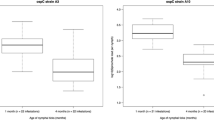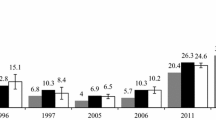Abstract
The field and laboratory evidence incriminating nymphalIxodes dammini as the main vectors ofBorrelia burgdorferi is substantial. Furthermore, other members of theIxodes (Ixodes) ricinus ‘complex’, includingI. ricinus, I. persulcatus, I. pacificus, andI. scapularis, are competent vectors of the Lyme disease spirochete. Although ticks in other genera are also naturally infected withB. burgdorferi, experimental evidence suggests thatAmblyomma andDermacentor ticks are inefficient vectors of these spirochetes. Current research on the kinetics ofB. burgdorferi growth within ticks demonstrates that Lyme disease spirochetes are dramatically influenced by physiological events during the tick's life-cycle.
Similar content being viewed by others
References
Afzelius, A., 1921.Erythema chronicum migrans. Acta Derm. Venereol., 2: 120–125.
Ai, C.-X., Wen, Y.-X., Zhang, J.-G., Wang, S.-S., Qiu, Q., Shi, Z., Li, D., Chen, D., Liu, X. and Zhao, J., 1988. Clinical manifestations and epidemiological characteristics of Lyme disease in Hailin County, Heilongjiang Province, China. Ann. N.Y. Acad. Sci., 539: 302–313.
Anderson, J.F., Magnarelli, L.A., Burgdorfer, W. and Barbour, A.G., 1983. Spirochetes inIxodes dammini and mammals from Connecticut. Am. J. Trop. Med. Hyg., 32: 818–824.
Anderson, J.F., Johnson, R.C., Magnarelli, L.A. and Hyde, F.W., 1985. Identification of endemic foci of Lyme disease: isolation ofBorrelia burgdorferi from feral rodents and ticks (Dermacentor variabilis). J. Clin. Microbiol., 22: 36–38.
Benach, J.L., Coleman, J.L., Skinner, R.A. and Bosler, E.M., 1987. AdultIxodes dammini on rabbits: A hypothesis for the development and transmission ofBorrelia burgdorferi. J. Infect. Dis., 155: 1300–1306.
Burgdorfer, W., 1984a. The New Zealand white rabbit: An experimental host for infecting ticks with Lyme disease spirochetes. Yale J. Biol. Med., 57: 609–612.
Burgdorfer, W., 1984b. Discovery of the Lyme disease spirochete and its relation to tick vectors. Yale J. Biol. Med. 57: 515–520.
Burgdorfer, W., 1986. Discovery of the Lyme disease spirochete: A historical review. Zentralbl. Bakteriol. Hyg. A., 263: 7–10.
Burgdorfer, W. and Gage, K.L., 1986. Susceptibility of the black-legged tick,Ixodes scapularis, to the Lyme disease spirochete,Borrelia burgdorferi. Zentralbl. Bakteriol. Hyg. A., 263: 15–20.
Burgdorfer, W. and Gage, K.L., 1987. Susceptibility of the hispid cotton rat (Sigmodon hispidus) to the Lyme disease spirochete (Borrelia burgdorferi). Am. J. Trop. Med. Hyg., 37: 624–628.
Burgdorfer, W., Barbour, A.G., Hayes, S.F., Benach, J.L., Grunwaldt, E. and Davis, J.P., 1982. Lyme disease—A tick-borne spirochetosis? Science, 216: 1317–1319.
Burgdorfer, W., Barbour, A.G., Hayes, S.F., Peter, O. and Aeschlimann, A., 1983.Erythema chronicum migrans—a tickborne spirochetosis. Acta Trop., 40: 79–83.
Burgdorfer, W., Lane, R.S., Barbour, A.G., Gresbrink, R.A., and Anderson, J.R., 1985. The western black-legged tick,Ixodes pacificus: A vector ofBorrelia burgdorferi. Am. J. Trop. Med. Hyg., 34: 925–930.
Burgess, E.C. and Patrican, L.A. 1987. Oral infection ofPeromyscus maniculatus withBorrelia burgdorferi and subsequent transmission byIxodes dammini. Am. J. Trop. Med. Hyg., 36: 402–407.
Carey, A.B., Krinsky, W.L. and Main, A.J., 1980.Ixodes dammini (Acari: Ixodidae) and associated ixodid ticks in south-central Connecticut, U.S.A. J. Med. Entomol., 17: 89–99.
Donahue, J.G., Piesman, J. and Spielman, A., 1987. Reservoir competence of white-footed mice for Lyme disease spirochetes. Am. J. Trop. Med. Hyg., 36: 92–96.
Falco, R.C. and Fish, D., 1988. Prevalence ofIxodes dammini near the homes of Lyme disease patients in Westchester County, New York, Am. J. Epidemiol., 127: 826–830.
Godsey, M.S. Jr., Amundson, T.E., Burgess, E.C., Schell, W., Davis, J.P., Kaslow, R. and Edelman, R., 1987. Lyme disease ecology in Wisconsin: Distribution and host preferences ofIxodes dammini, and prevalence of antibody toBorrelia burgdorferi in small mammals. Am. J. Trop. Med. Hyg., 37: 180–187.
Hoogstraal, H., 1981. Changing patterns of tickborne diseases in modern society. Annu. Rev. Entomol., 26: 75–99.
Kawabata, M., Baba, S., Iguchi, K., Yumaguti, N. and Russell, H., 1987. Lyme disease in Japan and its possible incriminated tick vector,Ixodes persulcatus. J. Infec. Dis., 156: 854.
Korenberg, E.I., Kryuchechnikov, V.N., Ananyina, Y.V. and Cherukha, Y.G., 1986. Prerequisites of the existence of Lyme disease in the U.S.S.R. Zentralbl. Bakteriol. Hyg. A., 263: 471–472.
Krampitz, H.E., 1986. In vivo isolation and maintenance of some wild strains of European hard tick spirochetes in mammalian and arthropod hosts. Zentralbl. Bakteriol. Hyg. A., 263: 21–28.
Lane, R.S., and Burgdorfer, W., 1987. Transovarial and transstadial passage ofBorrelia burgdorferi in the western black-legged tick,Ixodes pacificus (Acari: Ixodidae). Am. J. Trop. Med. Hyg., 37: 188–192.
Lane, R.S. and Lavoie, P.E., 1988. Lyme borreliosis in California: ecological and epidemiological studies. Ann. N.Y. Acad. Sci., 539: 192–203.
Levine, J.F., Wilson, M.L. and Spielman, A., 1985. Mice as reservoirs of the Lyme disease spirochete. Am. J. Trop. Med. Hyg., 34: 355–360.
Magnarelli, L.A., Anderson, J.F., Apperson, C.S., Fish, D., Johnson, R.C. and Chappel, W.A., 1986a. Spirochetes in ticks and antibodies toBorrelia burgdorferi in white-tailed deer from Connecticut, New York State, and North Carolina, J. Wildl. Dis., 22: 178–188.
Magnarelli, L.A., Anderson, J.F. and Barbour, A.G., 1986b. The etiologic agent of Lyme disease in deer flies, horse flies, and mosquitoes. J. Infect. Dis., 154: 355–358.
Magnarelli, L.A., Anderson, J.F. and Fish, D., 1987a. Transovarial transmission ofBorrelia burgdorferi inIxodes dammini (Acari: Ixodidae). J. Infect. Dis., 156: 234–236.
Magnarelli, L.A., Freier, J.E. and Anderson, J.F., 1987b. Experimental infections of mosquitoes withBorrelia burgdorferi, the etiologic agent of Lyme disease. J. Infect. Dis., 156: 694–695.
Main, A.J., Carey, A.B., Carey, M.G. and Goodwin, R.H., 1982. ImmatureIxodesdammini (Acari: Ixodidae) on small mammals in Connecticut, U.S.A., J. Med. Entomol., 19: 655–664.
Piesman, J. and Sinsky, R.J., 1988. Ability ofIxodes scapularis, Dermacentor variabilis, andAmblyomma americanum (Acari: Ixodidae) to acquire, maintain, and transmit Lyme disease spirochetes (Borrelia burgdorferi). J. Med. Entomol., 25: 336–339.
Piesman, J. and Spielman, A., 1979. Host-associations and seasonal abundance of immatureIxodes dammini in southeastern Massachusetts. Ann. Entomol. Soc. Am., 72: 829–832.
Piesman, J., Spielman, A., Etkind, P., Ruebush II, T.K. and Juranek, D.D., 1979. role of deer in the epizootiology ofBabesia microti in Massachusetts, U.S.A. J. Med. Entomol., 15: 537–540.
Piesman, J., Donahue, J.G., Mather, T.N., and Spielman, A., 1986a. Transovarially acquired Lyme disease spirochetes (Borrelia burgdorferi) in field-collected larvalIxodes dammini (Acari: Ixodidae). J. Med. Entomol., 23: 219.
Piesman, J., Mather, T.N., Donahue, J.G., Levine, J., Campbell, J.D., Karakashian, S.J. and Spielman, A., 1986b. Comparative prevalence ofBabesia microti andBorrelia burgdorferi in four populations ofIxodes dammini in eastern Massachusetts. Acta Trop. 43: 263–270.
Piesman, J., Hicks, T.C., Sinsky, R.J. and Obiri, G., 1987a. Simultaneous transmission ofBo burgdorferi andBabesia microti by individual nymphalIxodes dammini ticks. J. Clin. Microbiol., 25: 2012–2013.
Piesman, J., Mather, T.N., Dammin, G.J. Telford III, S.R., Lastavica, C.C. and Spielman, A., 1987b. Seasonal variation of transmission risk of Lyme disease and human babesiosis. Am. J. Epidemiol., 126: 1187–1189.
Piesman, J., Mather, T.N., Sinsky, R.J. and Spielman, A., 1987c. Duration of tick attachment andBorrelia burgdorferi transmission. J. Clin. Microbiol., 25: 557–558.
Radda, A., Burger, I., Stanek, G. and Wewalka, G., 1986. Austrian hard ticks as vectors ofBorrelia burgdorferi, overview. Zentralbl. Bakteriol. Hyg. A., 263: 79–82.
Rawlings, J.A., 1986. Lyme disease in Texas. Zentralbl. Bakteriol. Hyg. A., 263: 483–487.
Ribeiro, J.M.C., Mather, T.N., Piesman, J. and Spielman, A., 1987. Dissemination and salivary delivery of Lyme disease spirochetes in vector ticks (Acari: Ixodidae). J. Med. Entomol., 24: 201–205.
Schulze, T.L., Bowen, G.S., Bosler, E.M., Lakat, M.F., Parkin, W.E., Altman, R., Ormiston, B.G. and Shisler, J.K., 1984.Amblyomma americanum: a potential vector of Lyme disease in New Jersey. Science, 224: 1601–603.
Schulze, T.L., Bowen, G.S., Lakat, M.F., Parkin, W.E. and Shisler, J.K., 1985. The role of adultIxodes dammini (Acari: Ixodidae) in the transmission of Lyme disease in New Jersey, U.S.A. J. Med. Entomol. 22: 88–93.
Schulze, T.L., Lakat, M.F., Parkin, W.E., Shisler, J.K., Charette, D.J. and Bosler, E.M., 1986. Comparison of rates of infection by the Lyme disease spirochete in selected populations ofIxodes dammini andAmblyomma americanum (Acari: Ixodidae). Zentralbl. Bakteriol. Hyg. A., 263: 72–78.
Stanek, G., Burger, I., Hirschi, A., Wewalka, G. and Radda, A., 1986.Borrelia transfer by ticks during their life cycle. Zentralbl. Bakteriol. Hyg. A., 263: 29–33.
Steere, A.C., Broderick, T.F. and Malawista, S.E., 1978.Erythema chronicum migrans and Lyme arthritis: Epidemiologic evidence for a tick vector. Am. J. Epidemiol., 108: 312–321.
Steere, A.C., Sardinas, A.V., Lavoie, P.E., Birnbaum, N.J., Caputo, R.V. and Davis, J.P., 1981. Lyme disease—United States, 1980. Morb. Mortal. Wkly. Rep., 30: 489–497.
Steere, A.C., Grodzicki, R.L., Kornblatt, A.N., Craft, J.E., Barbour, A.G., Burgdorfer, W., Schmid, G.P., Johnson, E. and Malawista, S.E., 1983. The spirochetal etiology of Lyme disease. N. Eng. J. Med., 308: 733–742.
Steere, A.C., Snydman, D., Murray, P., Mensch, J., Main, A.J., Jr., Wallis, R.C., Shope, R.E. and Malawista, S.e., 1986. Historical perspectives of Lyme disease. Zentralbl. Bakteriol. Hyg. A., 263: 3–6.
Wallis, R.C., Brown, S.E., Kloter, K.O. and Main, A.J., Jr., 1978.Erythema chronicum migrans and Lyme arthritis: Field study of ticks. Am. J. Epidemiol., 108: 322–327.
Wilson, M.L. and Spielman, A., 1985. Seasonal activity of immatureIxodes dammini (Acari: Ixodidae). J. Med. Entomol., 22: 408–414.
Author information
Authors and Affiliations
Rights and permissions
About this article
Cite this article
Piesman, J. Transmission of Lyme disease spirochetes (Borrelia burgdorferi). Exp Appl Acarol 7, 71–80 (1989). https://doi.org/10.1007/BF01200454
Accepted:
Issue Date:
DOI: https://doi.org/10.1007/BF01200454




